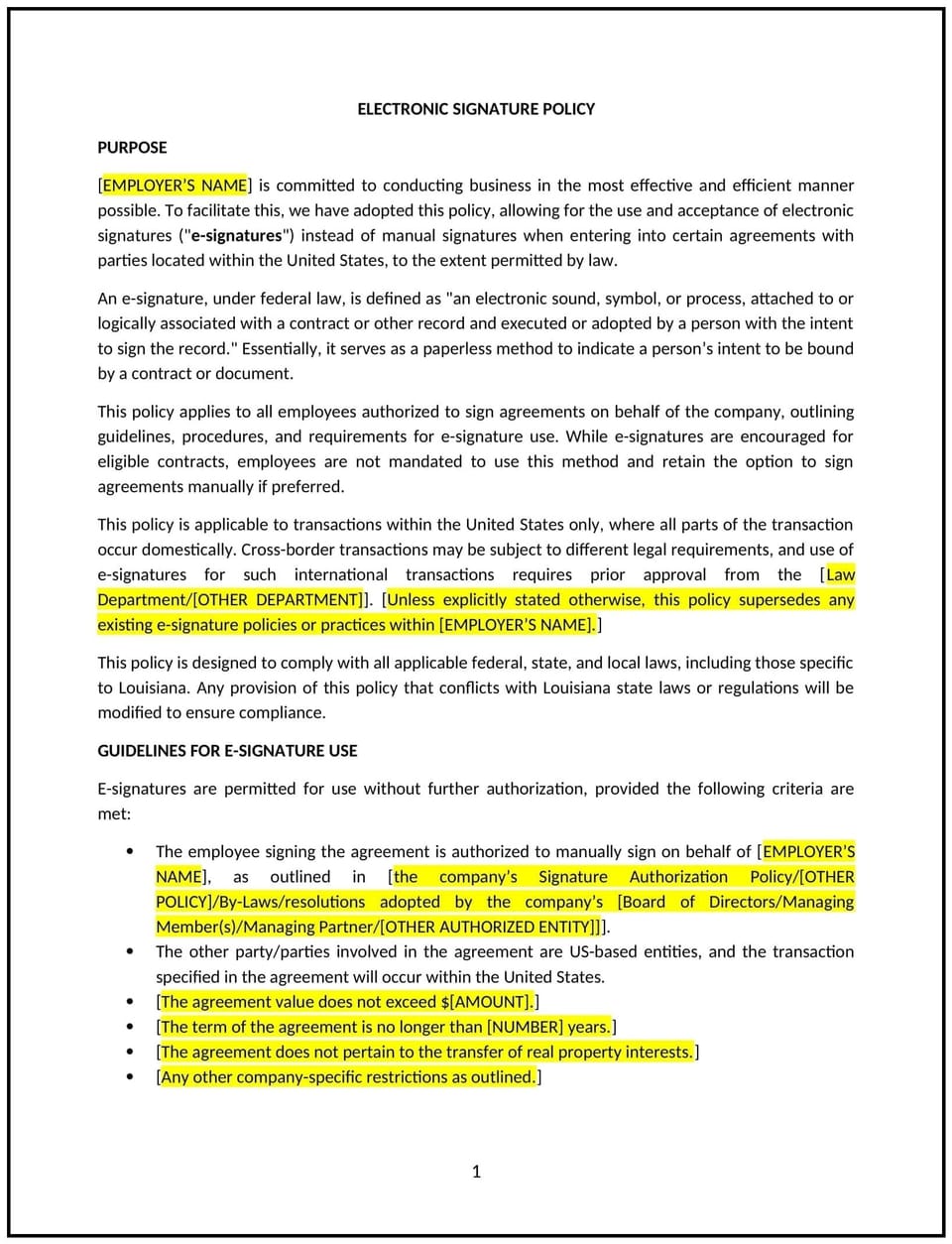Electronic signature policy (Louisiana): Free template

Electronic signature policy (Louisiana)
This electronic signature policy is designed to help Louisiana businesses establish guidelines for the use of electronic signatures in company transactions. It outlines the types of documents eligible for electronic signatures, the methods of obtaining and verifying them, and the responsibilities of employees involved in the process.
By implementing this policy, businesses can improve efficiency, reduce paperwork, and promote secure digital transactions.
How to use this electronic signature policy (Louisiana)
- Define eligible documents: Specify which types of agreements or records can be signed electronically, such as contracts, purchase orders, or employee documents.
- Outline approved methods: Identify acceptable electronic signature platforms or tools that meet industry standards for security and reliability.
- Establish verification procedures: Provide steps for verifying the authenticity of electronic signatures, including tracking audit trails.
- Clarify employee responsibilities: Detail the obligations of employees involved in obtaining or managing electronic signatures, such as ensuring document accuracy.
- Include record-keeping requirements: Specify how electronically signed documents should be stored and for how long.
- Address exceptions: Note situations where wet signatures may still be required due to legal or operational reasons.
Benefits of using an electronic signature policy (Louisiana)
Implementing this policy provides several advantages for Louisiana businesses:
- Increases efficiency: Streamlines workflows by reducing delays associated with paper-based signatures.
- Reduces costs: Minimizes expenses related to printing, mailing, and storing physical documents.
- Enhances security: Promotes the use of secure platforms to protect sensitive information.
- Provides flexibility: Allows for quicker transactions, especially in remote or hybrid work environments.
- Aligns with Louisiana-specific business needs: Reflects local operational practices and legal considerations.
Tips for using this electronic signature policy (Louisiana)
- Use reputable platforms: Choose electronic signature tools with robust security features and compliance with relevant standards.
- Train employees: Educate staff on how to use electronic signature tools effectively and securely.
- Monitor document authenticity: Regularly review audit trails to ensure the integrity of electronically signed documents.
- Adapt to evolving needs: Update the policy as technology and business requirements change.
- Maintain backups: Store electronically signed documents in secure, redundant systems to prevent data loss.
Q: What types of documents can be signed electronically under this policy?
A: Documents such as contracts, agreements, purchase orders, and employee forms may be eligible for electronic signatures, depending on the business's operations.
Q: What platforms are recommended for electronic signatures?
A: Businesses should use secure and reputable platforms, such as DocuSign, Adobe Sign, or other tools that provide audit trails and encryption.
Q: How can businesses verify the authenticity of electronic signatures?
A: Verification methods include using platforms with built-in audit trails, tracking IP addresses, and requiring multi-factor authentication.
Q: Are there situations where wet signatures are required?
A: Yes, certain legal or operational documents may still require wet signatures, such as specific court filings or notarized documents.
Q: How should electronically signed documents be stored?
A: Documents should be stored in secure digital systems with access controls and backup procedures to ensure their integrity and availability.
Q: How often should this policy be reviewed?
A: The policy should be reviewed annually or when changes in Louisiana regulations or technology impact electronic signature practices.
Q: What happens if an electronic signature is challenged?
A: The business should review the document’s audit trail, verify the signature’s origin, and consult legal counsel if necessary to resolve the dispute.
This article contains general legal information and does not contain legal advice. Cobrief is not a law firm or a substitute for an attorney or law firm. The law is complex and changes often. For legal advice, please ask a lawyer.


